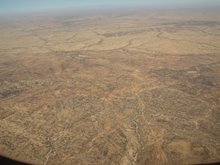Today's article from the Sudan Tribune is another example of how Western policy towards Sudan is evolving from passivity towards more aggressive pressure. This however, is not following the best direction. Any militaristic intervention, such as the enforcement of a no-fly zone, would not stop the killing, which is largely being carried out by low-tech militias ,nor would it not alter the stakes of the war for the regime in Khartoum. The military advantage such a ban might give to the rebel movements would be negated as Khartoum's logical reaction will be to rely even more heavily on the militias who have been responsible for the majority of war crimes in Darfur. This kind of intervention is, also, very likely to provoke a response against the humanitarian agencies operating in Darfur. These agencies are extremely vulnerable to government policies changes, and several flights, including a medical evacuation, have been refused by Khartoum for security reasons.
See this article by Alex de Waal for a very good description of why any military intervention risk backfiring dangerously on the vulnerable populations of Darfur.
Sudan Tribune, Sunday 4 February 2007 00:30.
By Wasil Ali
Feb 3, 2007 (LONDON) — Britain sent a strongly-worded warning to Sudanese President Omar Hassan al-Bashir, urging him to accept the deployment of hybrid peacekeeping force in Darfur or else Khartoum will face unspecified coercive measures.
Lord Triesman, the British minister in charge of African affairs told BBC Arabic Service that the world will not stand still while atrocities occur in Darfur.
Triesman further added that the world will not allow massacres similar to those of Rwanda, when the international community has been unable to intervene during the genocide that took place there in 1994.
Lord Triesman refused to rule out the possibility of direct military intervention against the Khartoum government, but he said that any move requires the approval of both the United Nations and the African Union.
The Sudanese President Omar al-Bashir has previously said that he agrees to the hybrid force proposal but sckepticism remained on his interpretation of the plan.
Prime Minister Tony Blair discussed last December with the US President George Bush plans to impose a no-fly zone over Sudan’s Darfur region while military planners in Washington are also developing plans for air strikes and a naval blockade to pressure Khartoum to stop the violence, the Financial Times reported.
He told President George W. Bush that they had to deal with Omar al-Bashir, the Sudanese president, in the next two to three months, if rapid progress is not made.
(ST)
Subscribe to:
Post Comments (Atom)

No comments:
Post a Comment